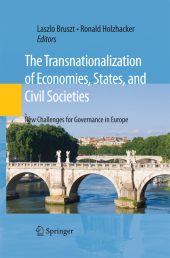 Neuerscheinungen 2014Stand: 2020-02-01 |
Schnellsuche
ISBN/Stichwort/Autor
|
Herderstraße 10
10625 Berlin
Tel.: 030 315 714 16
Fax 030 315 714 14
info@buchspektrum.de |

Laszlo Bruszt, Ronald Holzhacker
(Beteiligte)
The Transnationalization of Economies, States, and Civil Societies
New Challenges for Governance in Europe
Herausgegeben von Bruszt, Laszlo; Holzhacker, Ronald
2009. 2014. xii, 302 S. 20 Tabellen. 235 mm
Verlag/Jahr: SPRINGER, BERLIN; SPRINGER NEW YORK; SPRINGER 2014
ISBN: 1-489-98527-1 (1489985271)
Neue ISBN: 978-1-489-98527-9 (9781489985279)
Preis und Lieferzeit: Bitte klicken
This book brings together the study of transnationalization in three institutional fields: civil society, state and the economy. It also extends the research of processes of transnationalization to evolving new democracies and emerging market economies.
7. 1. 1 Research Question The electricity sector has undergone and continues to experience a fundamental transformation. Liberalization, deregulation and re-regulation have spread around the world, which has led to a far-reaching restructuring of the sector. In Europe, this trend has been reinforced by a European Union (EU) directive adopted in 1996. This directive alone, however, cannot suf ciently explain how and why most co- tries, some of them not members of the EU, decided to liberalize their electricity sectors. First, the directive gave large leeway to the member states about how to implement liberalization, and second, the phenomenon is an almost global trend, not limited to Europe. Therefore, Europeanization as an explanation for the electr- ity market s liberalization has been criticized for overemphasizing the impact of the EU (Fligstein and Merand 2001; Jordana et al. 2006; Levi-Faur 2004; Verdier and Breen 2001). A more encompassing approach to explain why governments decided to lib- alize their electricity markets is offered by the recent research agenda of trans- tionalization. Transnationalization can be de ned as [. . . ] the regular interactions between state and non-state actors across national boundaries aimed at shaping political and social outcomes at home, abroad, and in an emerging global sphere of governance (Orenstein and Schmitz 2006: 7). The approach of transnationalization includes both state and nonstate actors.
Three Converging Literatures of Transnationalization and the Varieties of Transnationalization: Introduction.- Transnational Integration Regimes as Development Programmes.- From Employee Governance to Corporate Governance: Transnational Forces and the Polish Corporate Governance Debates Since the 1980s.- The Domestic Regulation of Transnational Labour Markets: EU Enlargement and the Politics of Labour Migration in Switzerland and Ireland.- The Transnationalization of Change in Economic Institutions: The Case of Industrial Standards Regulations in Ukraine.- The Politics of the Competition State: The Agents and Mechanisms of State Transnationalization in Central and Eastern Europe.- Transnationalization and Domestic Policy-Making Processes: Electricity Market Reform in Belgium and Switzerland.- Transnationalization and the Georgian State: Myth or Reality?.- Transnational Strategies of Civil Society Organizations Striving for Equality and Nondiscrimination: Exchanging Information on New EU Directives, Coalition Strategies and Strategic Litigation.- National and European? Protesting the Lisbon Agenda and the Services Directive in the European Union.- Transnational Governance of Labour Standards: Insights from the Clothing Industry in Turkey.- Transnationalization and Its Governance - Actorhood and Power in the Shadow of Global Crisis.


